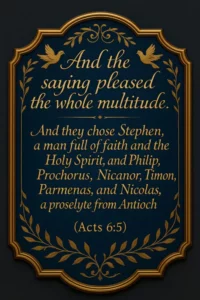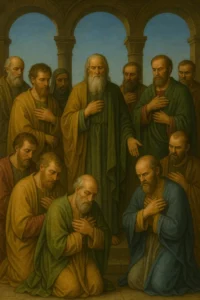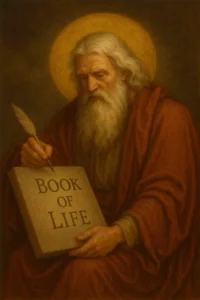 Is it not ironic that “Christians” celebrate Christmas? Christians are by name followers of Christ, and He says nothing in His Word about memorializing His birth year after year. The Bible is quite clear that the day of one’s death is more important (Ecclesiastes 7:1), and certainly, Christ’s death is particularly more important for our salvation and the fulfillment of God’s plan than His birth (Romans 5:6-21). So how did Christians come to believe that God approves of them celebrating Christmas?
Is it not ironic that “Christians” celebrate Christmas? Christians are by name followers of Christ, and He says nothing in His Word about memorializing His birth year after year. The Bible is quite clear that the day of one’s death is more important (Ecclesiastes 7:1), and certainly, Christ’s death is particularly more important for our salvation and the fulfillment of God’s plan than His birth (Romans 5:6-21). So how did Christians come to believe that God approves of them celebrating Christmas?
The answer is not as simple as one might think. It involves a minor controversy within today’s scattered church of God: Who are the Nicolaitans? Believe it or not, the Nicolaitans are in part responsible for “Christianity’s” acceptance of Christmas, Easter, Halloween, and other un-biblical practices.
Christians are warned of destructive and blasphemous doctrines being brought into the church in II Peter 2:1-3:
But there were also false prophets among the people, even as there will be false teachers among you, who will secretly bring in destructive heresies, even denying the Lord who bought them, and bring on themselves swift destruction. And many will follow their destructive ways, because of whom the way of truth will be blasphemed. By covetousness they will exploit you with deceptive words; for a long time their judgment has not been idle, and their destruction does not slumber.
More importantly, Nicolaitanism, representative of a much broader philosophy, can be blamed for the organized and systematic removal of God’s law as a central pillar of the Christian way of life. These things happened because of an attitude, an approach to the truth, found in the Nicolaitan heresy.
 And so, this article concerns itself with a single verse of Scripture. You can see by the verse call-out that there are, again, a lot of references that come out of this one verse. Let’s get started on our study of Acts 6:5
And so, this article concerns itself with a single verse of Scripture. You can see by the verse call-out that there are, again, a lot of references that come out of this one verse. Let’s get started on our study of Acts 6:5
(5) And the saying pleased the whole multitude. And they chose Stephen, a man full of faith and the Holy Spirit, and Philip, Prochorus, Nicanor, Timon, Parmenas, and Nicolas, a proselyte from Antioch,
A clue to the “Nicolaitanism” that Christ hates so vehemently (Revelation 2:6,15) is the lone occurrence of the name “Nicolas” here. It appears in the section describing the dispute between the Hebrews and the Hellenists over the neglect of the latter’s widows. To solve this problem, the church chooses seven deacons to oversee the physical work of distributing food to the needy brethren, and one of these is “Nicolas, a proselyte from Antioch.”
Nicolaitanism refers to a belief or practice mentioned in the Book of Revelation in the New Testament of the Bible. Specifically, in Revelation 2:6 “But this you have, that you hate the deeds of the Nicolaitans, which I also hate. and Revelation 2:15 “Thus you also have those who hold the doctrine of the Nicolaitans, which thing I hate. The Nicolaitans are described as a group whose teachings were condemned by Jesus. The exact nature of Nicolaitanism isn’t entirely clear, as the Bible does not provide extensive details about their practices or beliefs.
Historically, some early Christian writers and Church Fathers, such as Irenaeus and Clement of Alexandria, suggested that the Nicolaitans were a sect that promoted moral laxity and the acceptance of pagan practices, including idolatry and sexual immorality. They might have encouraged Christians to compromise with Roman society’s pagan customs, which would have been at odds with Christian teachings.
The name “Nicolaitans” has been linked to Nicolas, one of the seven deacons mentioned in Acts 6:5, though there is no definitive evidence that this Nicolas was directly associated with the sect.
Overall, Nicolaitanism is generally understood as representing a form of early Christian heresy or apostasy that deviated from orthodox Christian teachings.
Again, this description provides the most meager of hints about the man but enough to propose some conclusions. Nicolas is a Hellenist, meaning primarily that he spoke Greek, but probably also suggesting that he possessed a Greek education. As such, “they [the ‘Hellenists’] maintained a more liberal outlook than the ‘Hebrews,’ including the apostles” (F.F. Bruce, New Testament History, p. 219), especially regarding keeping the law. This “liberal outlook” toward the law later formed the heart of the debate at the Council of Jerusalem in AD 49 (Acts 15).
That Luke calls him a proselyte tells us that he is a Gentile who converted to Judaism before his calling to Christianity. Becoming a proselyte required a Gentile to keep Jewish law in its entirety, undergo circumcision, be baptized, and make a special sacrifice at the Temple. This rigorous process indicates that Nicolas must also have been quite devout and dedicated in his beliefs. The church’s choice of him as one of the first deacons reveals he likely possessed standout natural abilities and leadership qualities, as well as fulfilling the apostles’ qualifications of being “of good reputation, full of the Holy Spirit and wisdom” (Acts 6:3).
The last tidbit of information is that he is from Antioch, the largest city and capital of the Roman province of Syria. The city’s residents—Greeks, Macedonians, Syrians, Jews, Romans, and others—brought to it their own languages, cultures, philosophies, and religions. F.F. Bruce writes, “Its cosmopolitan population and material wealth provided an apt setting for cultural exchange and religious syncretism” (ibid., p. 264). This urban, multicultural, religious melange formed Nicolas’ background.
Unfortunately, it is in the context of syncretism that Nicolas is last mentioned in the post-biblical, historical record.
Syncretism refers to the blending or merging of different religious, cultural, or philosophical beliefs and practices into a cohesive system. It often occurs when distinct traditions come into contact with each other, leading to the incorporation of elements from one tradition into another.
In religion, syncretism might involve the fusion of rituals, deities, and doctrines from different faiths, resulting in a new, hybrid religious practice. For example, some forms of Christianity in Latin America incorporate elements of indigenous religions, creating syncretic practices that blend Christian and native beliefs.
Both Irenaeus (Against Heresies 1.26.3; 3.10.6) and Clement of Alexandria (Miscellanies, 3.4.25f) consider Nicolas of Antioch to be the founder of the Gnostic sect known as the Nicolaitans. Another early writer, Hippolytus, adds that Nicolas “departed from sound doctrine, and was in the habit of inculcating indifferency of both life and food” (Refutation of All Heresies, 7.24), meaning he taught the Gnostic belief of the irrelevance of physical things. 
In this first message to mankind, Satan sows seeds of doubt as to whether God can be trusted. Satan’s very first words were, “Has God indeed said…?”(Genesis 3:1) Spoken or not, this sentiment that God is untrustworthy, and that His Word is suspect, has been a regular feature in mankind’s relationship with God ever since.
The Gnostics were no exception—in fact, they are a prime example. In its most basic sense, Gnosticism is knowing, but its knowledge, while sometimes including the Word of God, does not have it as its foundation. Instead, more than what was contained in Scripture, Gnostics valued what they experienced, what elders told them, or what they learned from “angels,” astrology, or chemistry (alchemy). Thus, we see elements of Gnosticism in Galatians: a mixture of “lucky days,” to which they ascribed spiritual significance (part of their worship prior to conversion) and a belief, brought in by Judaizers or perhaps even an “angel” (Galatians 1:8), that justification could come by works of the law.
Judaism, though it has its roots in the Old Testament, sees God’s Word through the lens of Hellenism (Greek thought) and the traditions of Jewish scholars and teachers through the centuries. The Galatian Christians gave God’s Word lip service, but did not depend on it as the source of their beliefs and practices. If they had, they would not have returned to pagan “days, months, seasons, and years,” nor believed that justification could ever result from good works—a concept that is read into the Old Testament, but not actually found there.
This reinforces Clement’s claim that Nicolas became an ascetic (one who practices severe self-discipline and abstention from all forms of indulgence) and that his followers later perverted his teachings to encompass idolatry and immorality, becoming what we know as Nicolaitans.
From this information, we can hypothesize the evolution of Nicolaitanism. Roman church historian Eusebius writes that Nicolas himself was a moral man (Ecclesiastical History, 3.29). Though sincere and devout, he came to believe that the only way to grow spiritually was to consider his body and its desires as unimportant. In this way, he could ignore them in favor of spiritual pursuits. His fundamental doctrine appears to have been “the flesh must be treated with contempt.”
Over the years, however, this teaching took on a more Gnostic spin: Since the flesh is unimportant, even contemptible, what one does in the flesh is of no consequence. Spiritual life, growth, and ultimately salvation occur in the soul, and since God is spirit, He has no regard for the flesh. Therefore, Nicolaitans reasoned, what does it matter if one satisfies the flesh’s desires? At some point in its early history, then, Nicolaitanism evolved from an ascetic philosophy to a licentious one—one that Christ says He hates.
And so the meat of Acts 6:5 is that, as a result of the Greek Christians complaining about the treatment of their widows and orphans the church fathers created the Order of Deacons whose task was to do this work.
The unintended result, the choice of Nicholas, was to introduce conflict into the primitive church that lingers until today. We celebrate “religious” holidays that have their roots in pagan practices for syncretic reasons, and certain denominations believe that salvation by works is a “thing” when it is not in the Bible.
And of course, this was and is all part of God’s plan.

To see more of my work go to Jack’s Substack

Continuity planning, civilian and military







Recent Comments